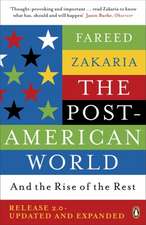The Irony of Vietnam: The System Worked: A Brookings Classic
Autor Leslie H. Gelb, Richard K. Betts Cuvânt înainte de Fareed Zakariaen Limba Engleză Paperback – 31 mai 2016
"If a historian were allowed but one book on the American involvement in Vietnam, this would be it." — Foreign Affairs When first published in 1979, four years after the end of one of the most divisive conflicts in the United States, The Irony of Vietnam raised eyebrows. Most students of the war argued that the United States had "stumbled into a quagmire in Vietnam through hubris and miscalculation," as the New York Times's Fox Butterfield put it. But the perspective of time and the opening of documentary sources, including the Pentagon Papers, had allowed Gelb and Betts to probe deep into the decisionmaking leading to escalation of military action in Vietnam. The failure of Vietnam could be laid at the door of American foreign policy, they said, but the decisions that led to the failure were made by presidents aware of the risks, clear about their aims, knowledgeable about the weaknesses of their allies, and under no illusion about the outcome.
The book offers a picture of a steely resolve in government circles that, while useful in creating consensus, did not allow for alternative perspectives. In the years since its publication, The Irony of Vietnam has come to be considered the seminal work on the Vietnam War.
The book offers a picture of a steely resolve in government circles that, while useful in creating consensus, did not allow for alternative perspectives. In the years since its publication, The Irony of Vietnam has come to be considered the seminal work on the Vietnam War.
Preț: 237.07 lei
Nou
Puncte Express: 356
Preț estimativ în valută:
45.36€ • 48.51$ • 37.82£
45.36€ • 48.51$ • 37.82£
Carte tipărită la comandă
Livrare economică 17 aprilie-01 mai
Preluare comenzi: 021 569.72.76
Specificații
ISBN-13: 9780815726784
ISBN-10: 0815726783
Pagini: 486
Dimensiuni: 140 x 216 x 38 mm
Greutate: 0.54 kg
Ediția:With a New Fore.
Editura: Brookings Institution Press
Colecția Brookings Institution Press
Seria A Brookings Classic
ISBN-10: 0815726783
Pagini: 486
Dimensiuni: 140 x 216 x 38 mm
Greutate: 0.54 kg
Ediția:With a New Fore.
Editura: Brookings Institution Press
Colecția Brookings Institution Press
Seria A Brookings Classic
Notă biografică
Leslie H. Gelb is among America's most prominent foreign policy experts. A Pulitzer Prize winner, former correspondent for the New York Times, and senior official in the state and defense departments, he is currently president emeritus and board senior fellow at the Council on Foreign Relations, where he served as president from 1993 to 2003. When he conceived of The Irony of Vietnam, which was awarded the American Political Science Association's Woodrow Wilson Award, he was a senior fellow at the Brookings Institution.
Richard K. Betts is an adjunct senior fellow for national security studies at the Council on Foreign Relations, the Arnold A. Saltzman professor of war and peace studies, as well as director of the Saltzman Institute of War and Peace Studies, and director of the international security policy program in the School of International and Public Affairs at Columbia University. On the faculty of Harvard University when he began work on The Irony of Vietnam, he completed it while a senior fellow at the Brookings Institution.
Richard K. Betts is an adjunct senior fellow for national security studies at the Council on Foreign Relations, the Arnold A. Saltzman professor of war and peace studies, as well as director of the Saltzman Institute of War and Peace Studies, and director of the international security policy program in the School of International and Public Affairs at Columbia University. On the faculty of Harvard University when he began work on The Irony of Vietnam, he completed it while a senior fellow at the Brookings Institution.
Textul de pe ultima copertă
When first published in 1979, four years after the end of one of the most
divisive conflicts in the United States, The Irony of Vietnam raised eyebrows. Most critics argued that the country had “stumbled into a quagmire in Vietnam through hubris and miscalculation,” as the New York Times put it. But Leslie H. Gelb and Richard K. Betts, who had reviewed recently declassified White House and Defense Department documents, maintained that policymakers in the Kennedy and Johnson administrations had their eyes open, had based decisions on a thorough knowledge of what was possible on the ground, and knew the cost of action and inaction. Explains Fareed Zakaria in his foreword, those prosecuting the war chose “middle-of-the-road solutions,” for a variety of what seemed reasonable assumptions. The overall tenor of the era that shaped foreign policy—the belief in the domino theory and a strident anti-communism—restricted policymakers’ thinking and prevented a more flexible approach, however. And thereby lies a lesson for today's policymakers
divisive conflicts in the United States, The Irony of Vietnam raised eyebrows. Most critics argued that the country had “stumbled into a quagmire in Vietnam through hubris and miscalculation,” as the New York Times put it. But Leslie H. Gelb and Richard K. Betts, who had reviewed recently declassified White House and Defense Department documents, maintained that policymakers in the Kennedy and Johnson administrations had their eyes open, had based decisions on a thorough knowledge of what was possible on the ground, and knew the cost of action and inaction. Explains Fareed Zakaria in his foreword, those prosecuting the war chose “middle-of-the-road solutions,” for a variety of what seemed reasonable assumptions. The overall tenor of the era that shaped foreign policy—the belief in the domino theory and a strident anti-communism—restricted policymakers’ thinking and prevented a more flexible approach, however. And thereby lies a lesson for today's policymakers
Descriere
"If a historian were allowed but one book on the American involvement in Vietnam, this would be it." — Foreign Affairs When first published in 1979, four years after the end of one of the most divisive conflicts in the United States, The Irony of Vietnam raised eyebrows. Most students of the war argued that the United States had "stumbled into a quagmire in Vietnam through hubris and miscalculation," as the New York Times's Fox Butterfield put it. But the perspective of time and the opening of documentary sources, including the Pentagon Papers, had allowed Gelb and Betts to probe deep into the decisionmaking leading to escalation of military action in Vietnam. The failure of Vietnam could be laid at the door of American foreign policy, they said, but the decisions that led to the failure were made by presidents aware of the risks, clear about their aims, knowledgeable about the weaknesses of their allies, and under no illusion about the outcome.
The book offers a picture of a steely resolve in government circles that, while useful in creating consensus, did not allow for alternative perspectives. In the years since its publication, The Irony of Vietnam has come to be considered the seminal work on the Vietnam War.
The book offers a picture of a steely resolve in government circles that, while useful in creating consensus, did not allow for alternative perspectives. In the years since its publication, The Irony of Vietnam has come to be considered the seminal work on the Vietnam War.
















